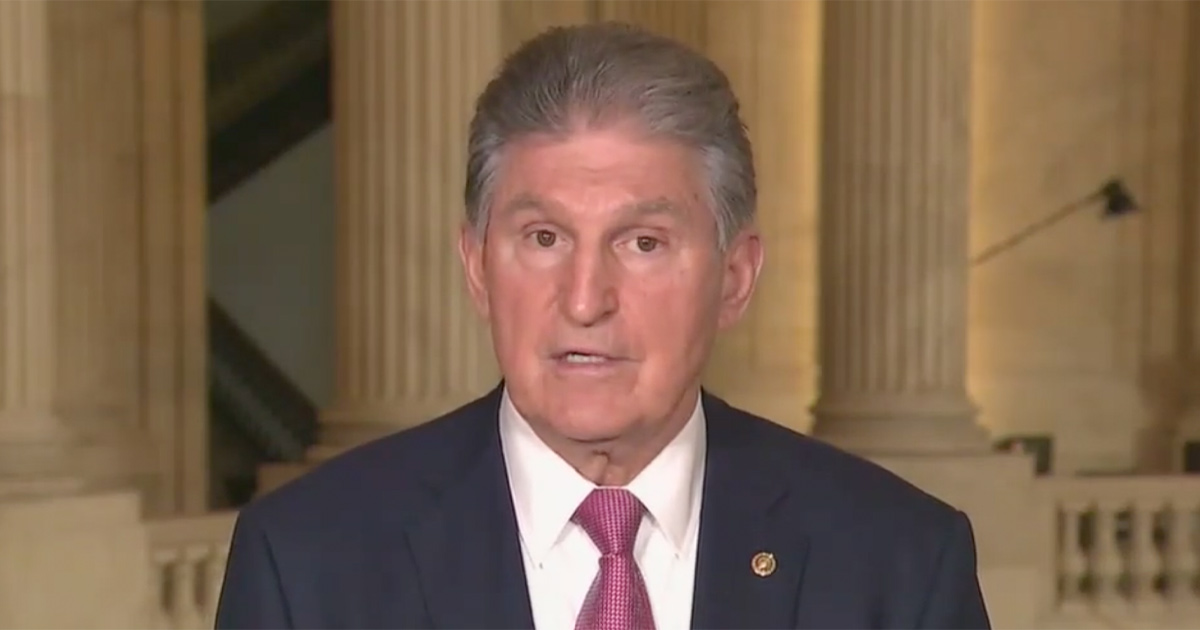Joe Manchin Issues Statement Throwing Massive Wrench Into Negotiations Over $3.5 Trillion Reconciliation Bill

Thursday’s scheduled House vote on a $1.2 trillion bipartisan infrastructure bill that passed the Senate with the help of 19 Republicans was already looking precarious, and on Wednesday, Sen. Joe Manchin (D-WV) didn’t do Speaker Nancy Pelosi any favors on that front.
Throughout the summer, Pelosi pledged that before the House takes up any action on a bipartisan bill, the Senate would have to also pass a larger bill containing President Joe Biden’s Build Back Better agenda that would cost $3.5 trillion over 10 years. She has has since reversed herself by scheduling a vote on Thursday, sans a larger Senate-approved bill. That has prompted a revolt by House progressives, who have pledged to hold Pelosi to her word in order to pass the president’s agenda. The Progressive Caucus has signaled it has the votes to sink the bipartisan bill.
Senate Democrats pegged the bigger piece of legislation, which has no chance of notching the 10 Republican votes necessary to pass through regular order, for passage through the budget reconciliation process, which requires a simple majority of 51 votes to pass. In a 50-50 Senate with Vice President Kamala Harris being the potential tie-breaker, all 50 Democrats would need to vote for the bill, assuming no Republicans would vote yes.
Manchin and Sen. Kyrsten Sinema (D-AZ) have been centrist roadblocks to Biden’s legislative agenda, which currently hangs in the balance. On Wednesday, Manchin issued a statement which began,
Every Member of Congress has a solemn duty to vote for what they believe is best for the country and the American people, not their party. Respectfully, as I have said for months, I can’t support $3.5 trillion more in spending when we have already spent $5.4 trillion since last March. At some point, all of us, regardless of party, must ask the simple question — how much is enough?”
The statement also said,
Proposing a historic expansion of social programs while ignoring the fact we are not in a recession and that millions of jobs remain open will only feed a dysfunction that could weaken our economic recovery. This is the shared reality we all now face, and it is this reality that must shape the future decisions that we, as elected leaders, must make.
Manchin closed by citing “careless spending” as a reason for opposing trillions in additional spending.
In response Rep. Pramila Jayapal (R-WA), chair of the Progressive Caucus in the House, said Manchin’s statement is likely to strengthen the resolve of progressive Democrats:
Jayapal says Manchin’s statement is only *solidifying* Dem opposition to tomorrow’s infrastructure vote.
“His statement has just probably created a bunch more votes on the House floor against a bipartisan bill.”
— Sarah Ferris (@sarahnferris) September 29, 2021
You can read Manchin’s full statement below:
Every Member of Congress has a solemn duty to vote for what they believe is best for the country and the American people, not their party. Respectfully, as I have said for months, I can’t support $3.5 trillion more in spending when we have already spent $5.4 trillion since last March. At some point, all of us, regardless of party must ask the simple question – how much is enough?
What I have made clear to the President and Democratic leaders is that spending trillions more on new and expanded government programs, when we can’t even pay for the essential social programs, like Social Security and Medicare, is the definition of fiscal insanity. Suggesting that spending trillions more will not have an impact on inflation ignores the everyday reality that America’s families continue pay an unavoidable inflation tax. Proposing a historic expansion of social programs while ignoring the fact we are not in a recession and that millions of jobs remain open will only feed a dysfunction that could weaken our economic recovery. This is the shared reality we all now face, and it is this reality that must shape the future decisions that we, as elected leaders, must make.
Since the beginning of this reconciliation debate, I have been consistent in my belief that any expansion of social programs must be targeted to those in need, not expanded beyond what is fiscally possible. Our tax code should be reformed to fix the flaws of the 2017 tax bill and ensure everyone pays their fair share but it should not weaken our global competitiveness or the ability of millions of small businesses to compete with the Amazons of the world. Overall, the amount we spend now must be balanced with what we need and can afford – not designed to reengineer the social and economic fabric of this nation or vengefully tax for the sake of wishful spending.
In August, I recommended we take a strategic pause to provide time to develop the right policies and to continue to monitor how the pandemic and economic factors are affecting our nation’s fiscal situation before we spend more. Throughout September, I have made it clear to all those who would listen the need to means test any new social programs so that we are helping those who need it the most, not spend for the sake of spending.
While I am hopeful that common ground can be found that would result in another historic investment in our nation, I cannot – and will not – support trillions in spending or an all or nothing approach that ignores the brutal fiscal reality our nation faces. There is a better way and I believe we can find it if we are willing to continue to negotiate in good faith.
If there is one final lesson that will continue to guide me in this difficult debate ahead it is this: America is a great nation but great nations throughout history have been weakened by careless spending and bad policies. Now, more than ever, we must work together to avoid these fatal mistakes so that we may fulfill our greatest responsibility as elected leaders and pass on a better America to the next generation.
New: The Mediaite One-Sheet "Newsletter of Newsletters"
Your daily summary and analysis of what the many, many media newsletters are saying and reporting. Subscribe now!






Comments
↓ Scroll down for comments ↓